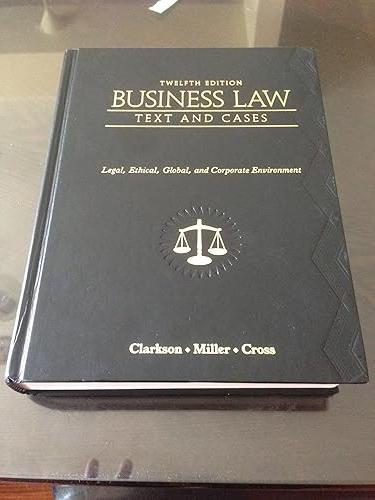The plaintiff, Joseph M. Orlando, a lawyer, fi led a onecount complaint for slander against Garrick F.
Question:
The plaintiff, Joseph M. Orlando, a lawyer, fi led a onecount complaint for slander against Garrick F. Cole, who is also a lawyer.
The complaint alleges that Orlando suffered harm to his reputation as an attorney as a result of comments made by Cole to newspaper reporters about Orlando’s role in a criminal investigation involving Cole’s client. Cole fi led a motion to dismiss the complaint * * * , which was allowed.
* * * Orlando’s complaint and the exhibits attached thereto assert the following facts. In February 2005, Orlando was representing a seventeen-year-old high school student who claimed that her basketball coach, Thomas A. Atwater, sexually assaulted her. Atwater apparently was an acquaintance of Orlando’s.
After the alleged incident, Atwater, then unrepresented, approached Orlando, admitted that he committed the act, signed an affi davit to that effect, and then went to the police and made a full confession.
* * * A few days later, Orlando spoke to two newspaper reporters, gave them a copy of Atwater’s affi davit, and explained the circumstances under which Atwater gave the affi davit. Before publishing their article, the reporters approached Cole, who by this time was representing Atwater in the criminal matter, and asked for Cole’s comments.
Cole responded that “the affi davit is ‘inaccurate’ and called Orlando’s actions ‘deceitful’ and
‘fraudulent.’ ” The article further stated, “Cole would not say what he thought was inaccurate in the affi davit.” Both Orlando’s and Cole’s comments were reported together in various publications. Orlando then sued Cole for slander. The complaint alleged that Cole’s comments were false, “described conduct by
[Orlando] undertaken in his profession and business, and impute an unfi tness for or a misconduct in his offi ce or employment.”
* * * The standard by which a complaint is measured on a motion to dismiss for failure to state a claim is a lenient one. “The allegations of the complaint, as well as such inferences as may be drawn therefrom in the plaintiff’s favor, are to be taken as true.” Doubts are resolved in favor of the plaintiff, and the motion must be denied unless it is certain that no set of provable facts could entitle the plaintiff to relief.
We begin with a threshold inquiry into whether the comments are “ ‘reasonably susceptible of a defamatory connotation [implication],’
so as to warrant their submission to a jury to determine if in fact the defamatory connotation was conveyed. A statement is defamatory in the circumstances if it discredits a person in the minds of any considerable and respectable class of the community.” We conclude that the comments at issue are susceptible of a defamatory connotation because each of the terms used—
“inaccurate,” “fraudulent,” and
“deceitful”—impl[ies] misconduct.
[Emphasis added.]
We now turn to whether Cole’s statements were ones of fact, or opinion, or a combination of both.
“The determination whether a statement is one of fact or opinion is generally considered a question of law.” The distinction is critical because “under the First Amendment, there is no such thing as a false idea. However pernicious
[destructive] an opinion may seem, we depend for its correction not on the conscience of judges and juries but on the competition of other ideas. But there is no constitutional value in false statements of fact.”
To determine whether a statement is opinion, a court must
“examine the statement in its totality in the context in which it was uttered or published.” In doing so, “the court must consider all the words used, not merely a particular phrase or sentence. In addition, the court must give weight to cautionary terms used by the person publishing the statement. Finally, the court must consider all of the circumstances surrounding the statement, including the medium by which the statement is disseminated and the audience to which it is published.” If the “average reader”
could understand the allegedly libelous statements as either fact or opinion, the determination is for the jury.
Cole’s allegations that the affi davit signed by Atwater was “inaccurate”
and that Orlando’s conduct was “fraudulent” and “deceitful” are factual because they are capable of being proved false. These comments were not presented as opinions nor accompanied by any cautionary language. Even if we were to conclude that these statements were an expression of opinion, they appear to be based on undisclosed defamatory facts, namely the unreported private communications between Cole and his new client, Atwater.
“Defamation can occur by innuendo as well as by explicit assertion.” As previously noted, the terms imply misconduct. Because, within the context of the article, a reader could view Cole’s comments as based on undisclosed defamatory facts, they are not protected under the First Amendment.
[Emphasis added.]
In short, dismissal * * * was premature. * * * We reverse the judgment and remand the case to the [trial court] for further proceedings consistent with this [court’s opinion].
Questions:-
1. Orlando sued Cole for slander. Why didn’t he sue for libel, given that the comments were reported in various news publications?
2. What did the court mean when it stated that “under the First Amendment there is no such thing as a false idea”?
Step by Step Answer:

Business Law Text And Cases Legal Ethical Global And Corporate Environment
ISBN: 9780538470827
12th Edition
Authors: Kenneth W. Clarkson, Roger LeRoy Miller, Frank B. Cross





